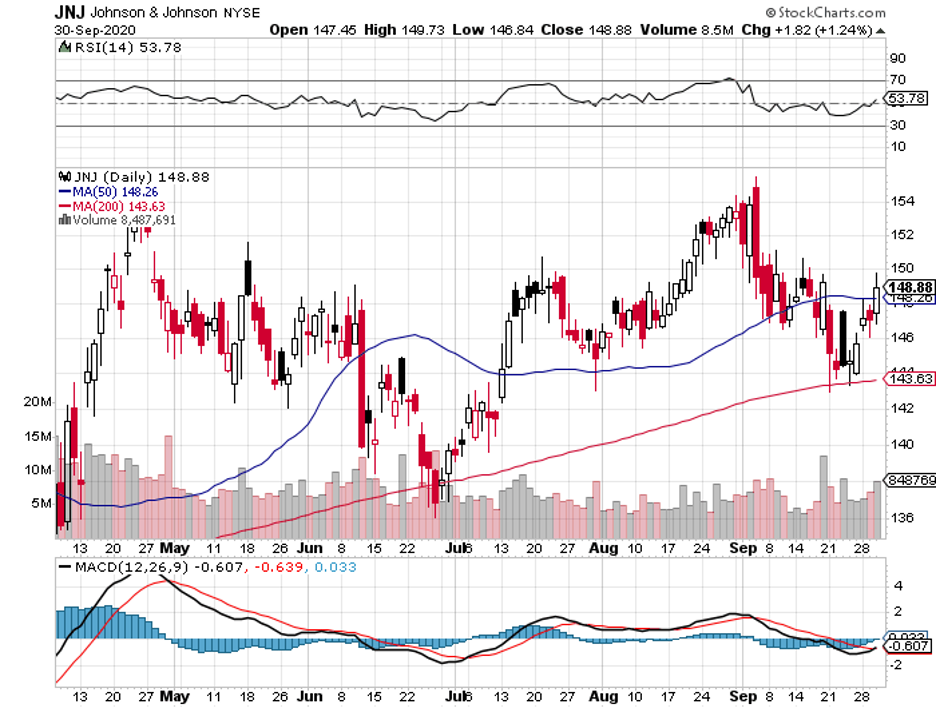Can this Dividend King Be the Next Vaccine King?
One area that Johnson & Johnson (JNJ) has not been a leader in for the past years is vaccine development.
That could change soon however.
Among the healthcare companies racing to develop a COVID-19 vaccine these days, JNJ has been a heavy favorite to come up with the most potent candidate.
Although the company started its clinical trials two months after Moderna (MRNA) and the partners Pfizer (PFE) and BioNTech (BNTX) started theirs, JNJ might release results even earlier than November.
This is because JNJ’s vaccine candidate, called Ad26.COV2.S, worked quickly on the patients after only a single dose.
In comparison, Moderna and Pfizer’s candidates need a first dose and then, after a month, a second dose or a booster shot.
While it could take a month or two for Moderna and Pfizer’s vaccines to take effect, those given Ad26.COV2.S could be protected after two weeks.
Moderna and Pfizer both use messenger-RNA technology for their vaccines, while JNJ utilizes a hollowed-out virus to deliver the DNA instructions to the relevant cells to trigger a protein spike and provoke an immune response.
This is the same method the company used in its Ebola vaccine, which has been instrumental in the immunization programs in Africa.
Inasmuch as Ad26.COV2.S offers incredible potency compared to other candidates, there is one potential trade-off: our immune system might later on start to resist the drug.
However, JNJ is attempting to resolve this issue by developing a booster shot for future use.
Meanwhile, Moderna and Pfizer’s vaccine candidates could be given as many times as possible without that risk.
JNJ’s vaccine can also be distributed and stored without any special handling unlike its rivals, which require lower temperatures. This means that the vaccine can be delivered to even the less-developed facilities.
Other than eliminating the logistical problem of people failing to get a second shot of the vaccine, JNJ’s one-shot regimen can guarantee that governments can vaccinate 1 billion people annually.
Only a handful of the manufacturers can match that claim, offering JNJ an edge regardless of the seven-month head start of the other developers.
Apart from JNJ, Pfizer, and Moderna, more companies have started their late-stage vaccine trials. The list includes AstraZeneca (AZN), Inovio Pharmaceuticals (INO), Novavax (NVAX), and Sanofi (SNY).
Outside its COVID-19 programs, JNJ has been delivering solid results despite the ongoing crisis.
The company’s pharmaceutical division showed notable growth in the second quarter, with its immunology drugs leading the charge.
In terms of sales in this quarter, rheumatoid arthritis and Crohn’s disease drug Remicade raked in $935 million while severe rheumatoid, psoriatic, and ankylosing spondylitis injection Simponi brought in $526 million.
Meanwhile, psoriasis medicines Stelara and Tremfya generated an impressive $1.7 billion and $342 million, respectively.
JNJ is also expanding its portfolio to cover the biotechnology market. So far, one of its most telling moves is its $6.5 billion all-cash acquisition of Momental Pharmaceuticals.
Buoyed by these promising results, JNJ boosted its full-year revenue guidance for 2020 with operational sales estimated to reach somewhere between $81 billion and $82.5 billion.
JNJ has been widely known for its consumer products, but the truth is that the company’s forte is actually healthcare.
In 2019, JNJ’s pharmaceutical sector comprised nearly 50% while medical devices generated roughly one-third of the company's total sales. These figures may very well be the reason why this stock is gaining traction among retirees.
After all, healthcare is where the money lies – and JNJ is now the biggest healthcare conglomerate in the world.
In fact, the company serves over 1 billion patients on a daily basis and 12 of the products in its portfolio can easily generate $2 billion in sales annually.
The company’s cash flows have also been steadily increasing, setting off an impressive 58-year streak of consistent and consecutive dividend boost every year.
Needless to say, JNJ has been hailed the “Dividend King” in the healthcare sector for decades now.
Simply looking at JNJ profile, track record, and pipeline, it’s clear to see that buying and holding JNJ shares and reinvesting the dividends you receive along the way could give your portfolio a substantial boost.

